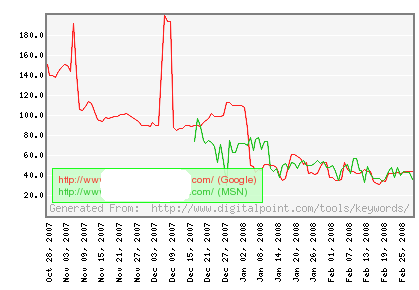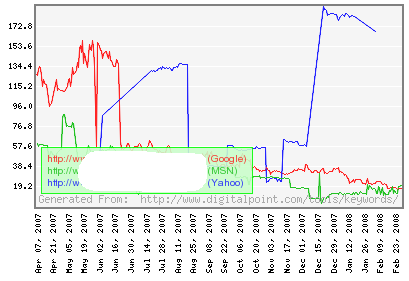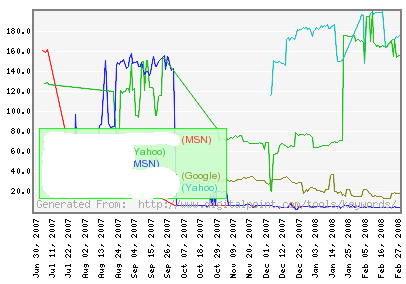Yahoo! has guys like Jeremy Zawodny marketing their fresh new search platform, and yet they remain behind the competition. Microsoft jumped into the search field way later than Yahoo! did, so why is it that Microsoft rankings for well promoted sites often roughly track Google rankings, while Yahoo! still has yet to give many of these sites an opportunity to rank?
Here are some examples of what I am talking about (with URLs expunged to protect the guilty)...
A couple year old site that was lingering about with a few inbound links and was promoted last November. Notice how quickly both Google and Microsoft took to the marketing, whereas Yahoo is still nowhere to be found

Here is a site that was promoted from brand new. Notice how Google and Microsoft are trending toward trusting it more and more, while Yahoo! Search occasionally picks it up and then spits it back out again

Here is yet another newish site that Microsoft loves and Google is starting to like more and more. Yahoo! is still nowhere to be found

If you had to pick the 1,000 most competitive keywords on the web I think all 3 of the above would fall in that group. I could list numerous other example sites as well. All the above sites have been in the Yahoo! Directory for at least 4 months. Even with new sites and a moderate amount of targeted promotion it is not that hard to work your way up into Google and Microsoft's rankings, but Yahoo usually ignores it.
I have highlighted that Yahoo! Search has their domain authority score overemphasized in their relevancy algorithms, which causes a lot of parasitic SEO to dominate their search results, but do they even care?
Can you rank a new site in Yahoo! for terms like insurance without getting it nuked in Google? What makes Yahoo! so much slower at ranking new sites than the other major search engines?


